Detailed Analysis of Contract Law Principles in Various Case Scenarios
VerifiedAdded on 2019/10/30
|7
|1533
|198
Homework Assignment
AI Summary
This assignment solution addresses several contract law scenarios. The first part examines whether a valid contract existed between Ian and Ben, focusing on offer, acceptance, and rejection, and determining whether Ian can claim for breach of contract. The second part investigates whether Sharon can sue Ben for breach of contract, considering the defense of unilateral mistake. The analysis draws on case law such as Hyde v Wrench and Smith v Hughes. The second answer delves into misrepresentation, assessing whether Gordon can rescind a contract with Mary and who has a stronger claim to a car, Gordon or Cheng. The analysis explores misrepresentation elements and the impact of third-party rights, referencing Car & Universal Credit v Caldwell. The assignment provides a detailed legal analysis of each scenario, applying relevant legal principles and case law.

Running Head: Law 1
Law
Law
Paraphrase This Document
Need a fresh take? Get an instant paraphrase of this document with our AI Paraphraser
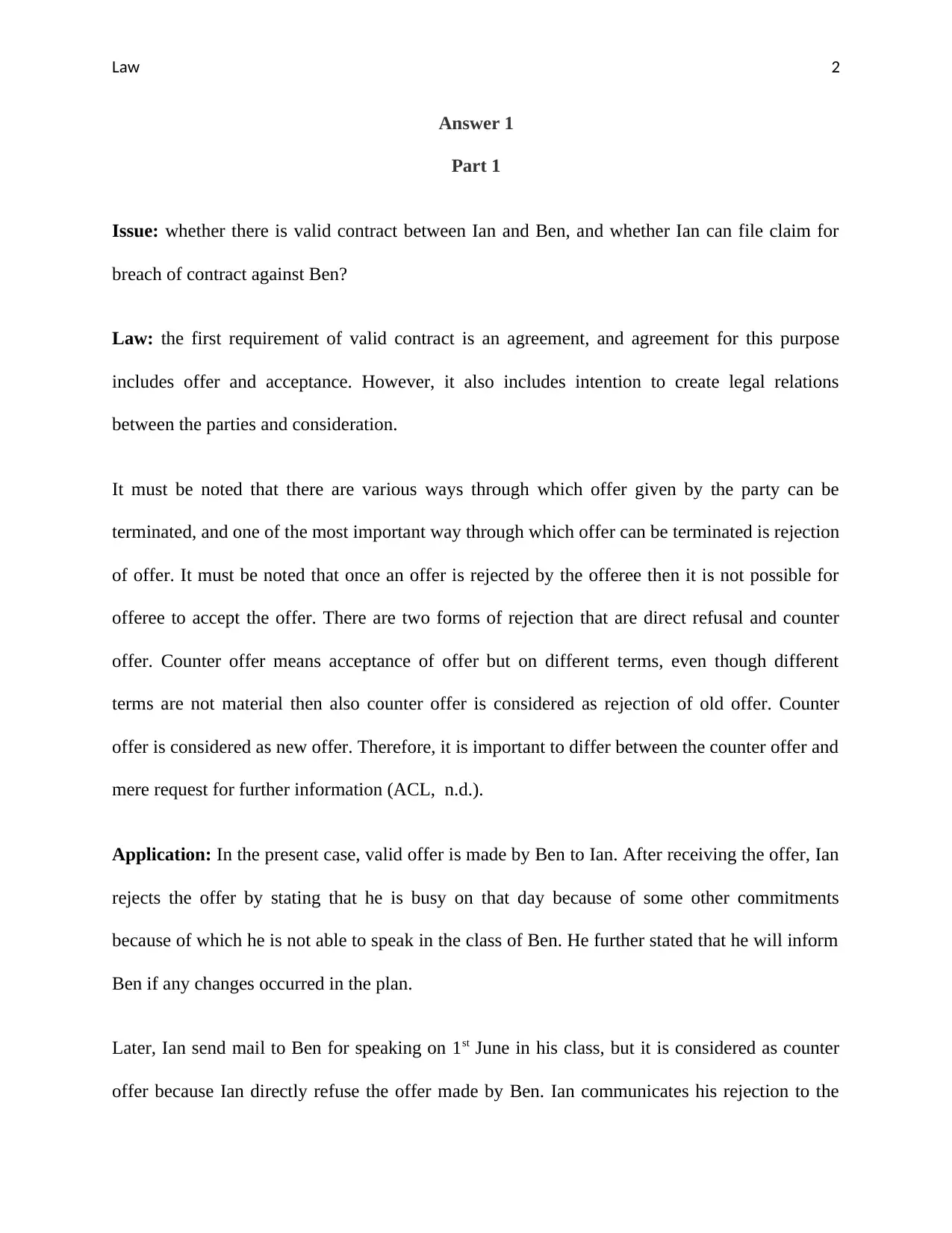
Law 2
Answer 1
Part 1
Issue: whether there is valid contract between Ian and Ben, and whether Ian can file claim for
breach of contract against Ben?
Law: the first requirement of valid contract is an agreement, and agreement for this purpose
includes offer and acceptance. However, it also includes intention to create legal relations
between the parties and consideration.
It must be noted that there are various ways through which offer given by the party can be
terminated, and one of the most important way through which offer can be terminated is rejection
of offer. It must be noted that once an offer is rejected by the offeree then it is not possible for
offeree to accept the offer. There are two forms of rejection that are direct refusal and counter
offer. Counter offer means acceptance of offer but on different terms, even though different
terms are not material then also counter offer is considered as rejection of old offer. Counter
offer is considered as new offer. Therefore, it is important to differ between the counter offer and
mere request for further information (ACL, n.d.).
Application: In the present case, valid offer is made by Ben to Ian. After receiving the offer, Ian
rejects the offer by stating that he is busy on that day because of some other commitments
because of which he is not able to speak in the class of Ben. He further stated that he will inform
Ben if any changes occurred in the plan.
Later, Ian send mail to Ben for speaking on 1st June in his class, but it is considered as counter
offer because Ian directly refuse the offer made by Ben. Ian communicates his rejection to the
Answer 1
Part 1
Issue: whether there is valid contract between Ian and Ben, and whether Ian can file claim for
breach of contract against Ben?
Law: the first requirement of valid contract is an agreement, and agreement for this purpose
includes offer and acceptance. However, it also includes intention to create legal relations
between the parties and consideration.
It must be noted that there are various ways through which offer given by the party can be
terminated, and one of the most important way through which offer can be terminated is rejection
of offer. It must be noted that once an offer is rejected by the offeree then it is not possible for
offeree to accept the offer. There are two forms of rejection that are direct refusal and counter
offer. Counter offer means acceptance of offer but on different terms, even though different
terms are not material then also counter offer is considered as rejection of old offer. Counter
offer is considered as new offer. Therefore, it is important to differ between the counter offer and
mere request for further information (ACL, n.d.).
Application: In the present case, valid offer is made by Ben to Ian. After receiving the offer, Ian
rejects the offer by stating that he is busy on that day because of some other commitments
because of which he is not able to speak in the class of Ben. He further stated that he will inform
Ben if any changes occurred in the plan.
Later, Ian send mail to Ben for speaking on 1st June in his class, but it is considered as counter
offer because Ian directly refuse the offer made by Ben. Ian communicates his rejection to the
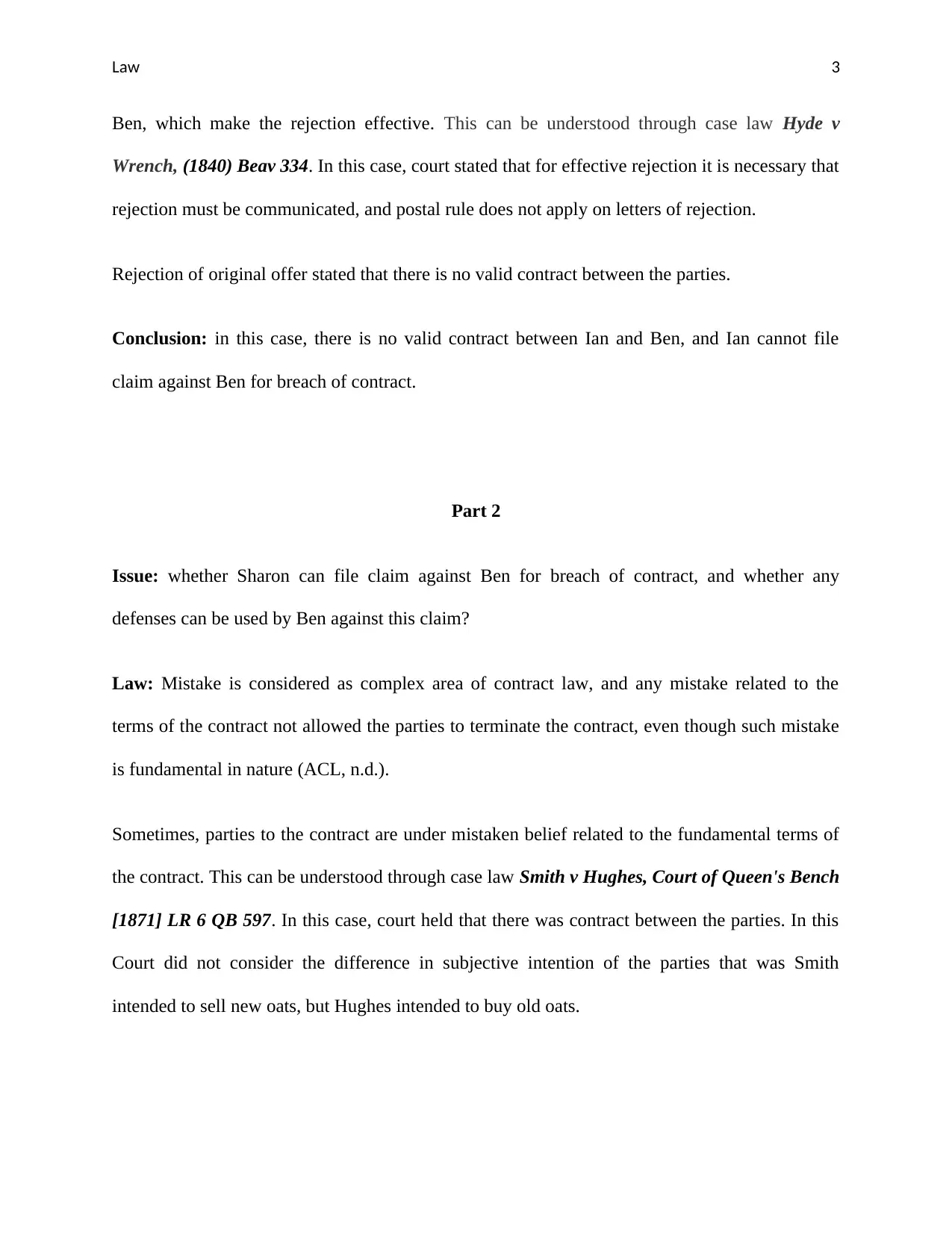
Law 3
Ben, which make the rejection effective. This can be understood through case law Hyde v
Wrench, (1840) Beav 334. In this case, court stated that for effective rejection it is necessary that
rejection must be communicated, and postal rule does not apply on letters of rejection.
Rejection of original offer stated that there is no valid contract between the parties.
Conclusion: in this case, there is no valid contract between Ian and Ben, and Ian cannot file
claim against Ben for breach of contract.
Part 2
Issue: whether Sharon can file claim against Ben for breach of contract, and whether any
defenses can be used by Ben against this claim?
Law: Mistake is considered as complex area of contract law, and any mistake related to the
terms of the contract not allowed the parties to terminate the contract, even though such mistake
is fundamental in nature (ACL, n.d.).
Sometimes, parties to the contract are under mistaken belief related to the fundamental terms of
the contract. This can be understood through case law Smith v Hughes, Court of Queen's Bench
[1871] LR 6 QB 597. In this case, court held that there was contract between the parties. In this
Court did not consider the difference in subjective intention of the parties that was Smith
intended to sell new oats, but Hughes intended to buy old oats.
Ben, which make the rejection effective. This can be understood through case law Hyde v
Wrench, (1840) Beav 334. In this case, court stated that for effective rejection it is necessary that
rejection must be communicated, and postal rule does not apply on letters of rejection.
Rejection of original offer stated that there is no valid contract between the parties.
Conclusion: in this case, there is no valid contract between Ian and Ben, and Ian cannot file
claim against Ben for breach of contract.
Part 2
Issue: whether Sharon can file claim against Ben for breach of contract, and whether any
defenses can be used by Ben against this claim?
Law: Mistake is considered as complex area of contract law, and any mistake related to the
terms of the contract not allowed the parties to terminate the contract, even though such mistake
is fundamental in nature (ACL, n.d.).
Sometimes, parties to the contract are under mistaken belief related to the fundamental terms of
the contract. This can be understood through case law Smith v Hughes, Court of Queen's Bench
[1871] LR 6 QB 597. In this case, court held that there was contract between the parties. In this
Court did not consider the difference in subjective intention of the parties that was Smith
intended to sell new oats, but Hughes intended to buy old oats.
⊘ This is a preview!⊘
Do you want full access?
Subscribe today to unlock all pages.

Trusted by 1+ million students worldwide
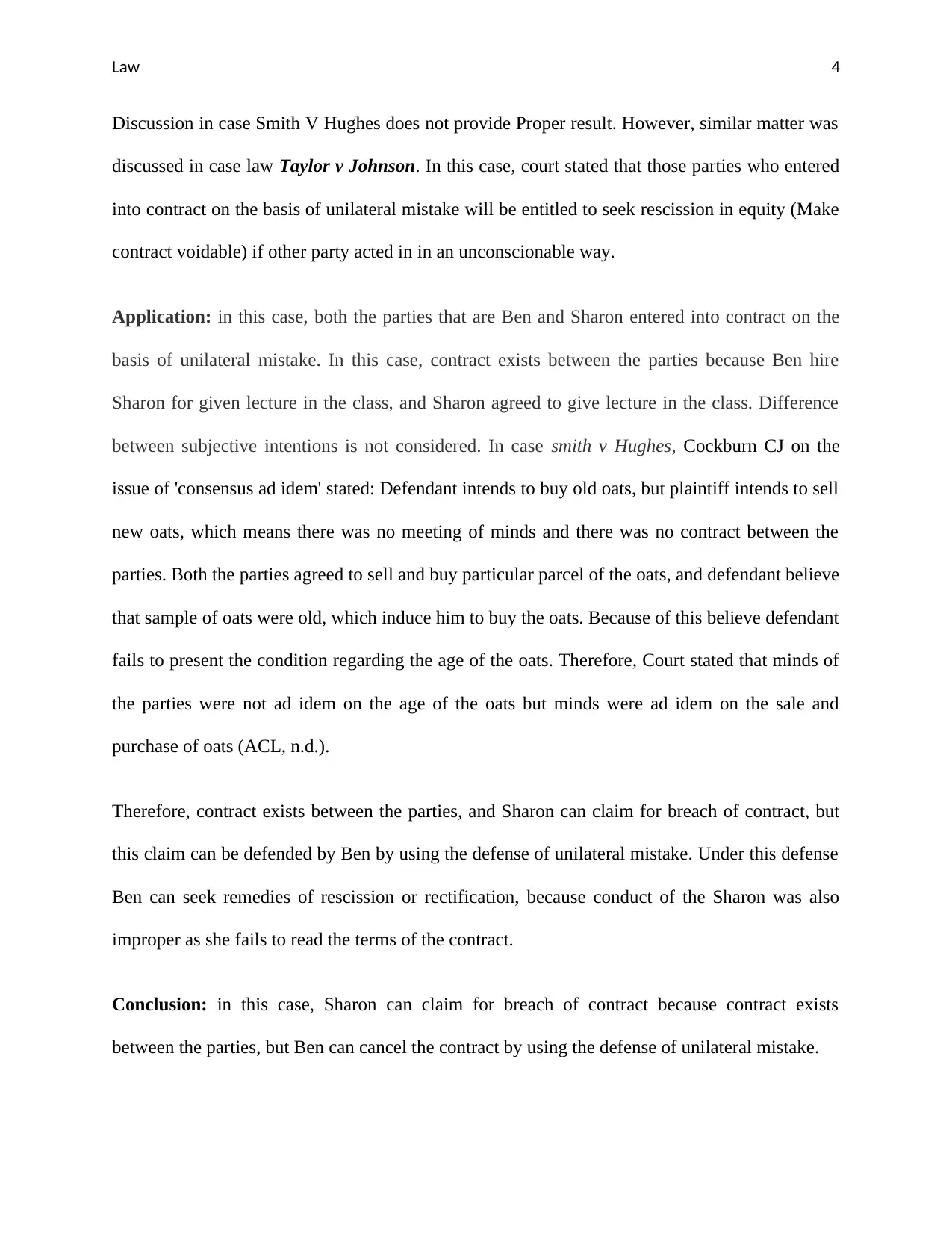
Law 4
Discussion in case Smith V Hughes does not provide Proper result. However, similar matter was
discussed in case law Taylor v Johnson. In this case, court stated that those parties who entered
into contract on the basis of unilateral mistake will be entitled to seek rescission in equity (Make
contract voidable) if other party acted in in an unconscionable way.
Application: in this case, both the parties that are Ben and Sharon entered into contract on the
basis of unilateral mistake. In this case, contract exists between the parties because Ben hire
Sharon for given lecture in the class, and Sharon agreed to give lecture in the class. Difference
between subjective intentions is not considered. In case smith v Hughes, Cockburn CJ on the
issue of 'consensus ad idem' stated: Defendant intends to buy old oats, but plaintiff intends to sell
new oats, which means there was no meeting of minds and there was no contract between the
parties. Both the parties agreed to sell and buy particular parcel of the oats, and defendant believe
that sample of oats were old, which induce him to buy the oats. Because of this believe defendant
fails to present the condition regarding the age of the oats. Therefore, Court stated that minds of
the parties were not ad idem on the age of the oats but minds were ad idem on the sale and
purchase of oats (ACL, n.d.).
Therefore, contract exists between the parties, and Sharon can claim for breach of contract, but
this claim can be defended by Ben by using the defense of unilateral mistake. Under this defense
Ben can seek remedies of rescission or rectification, because conduct of the Sharon was also
improper as she fails to read the terms of the contract.
Conclusion: in this case, Sharon can claim for breach of contract because contract exists
between the parties, but Ben can cancel the contract by using the defense of unilateral mistake.
Discussion in case Smith V Hughes does not provide Proper result. However, similar matter was
discussed in case law Taylor v Johnson. In this case, court stated that those parties who entered
into contract on the basis of unilateral mistake will be entitled to seek rescission in equity (Make
contract voidable) if other party acted in in an unconscionable way.
Application: in this case, both the parties that are Ben and Sharon entered into contract on the
basis of unilateral mistake. In this case, contract exists between the parties because Ben hire
Sharon for given lecture in the class, and Sharon agreed to give lecture in the class. Difference
between subjective intentions is not considered. In case smith v Hughes, Cockburn CJ on the
issue of 'consensus ad idem' stated: Defendant intends to buy old oats, but plaintiff intends to sell
new oats, which means there was no meeting of minds and there was no contract between the
parties. Both the parties agreed to sell and buy particular parcel of the oats, and defendant believe
that sample of oats were old, which induce him to buy the oats. Because of this believe defendant
fails to present the condition regarding the age of the oats. Therefore, Court stated that minds of
the parties were not ad idem on the age of the oats but minds were ad idem on the sale and
purchase of oats (ACL, n.d.).
Therefore, contract exists between the parties, and Sharon can claim for breach of contract, but
this claim can be defended by Ben by using the defense of unilateral mistake. Under this defense
Ben can seek remedies of rescission or rectification, because conduct of the Sharon was also
improper as she fails to read the terms of the contract.
Conclusion: in this case, Sharon can claim for breach of contract because contract exists
between the parties, but Ben can cancel the contract by using the defense of unilateral mistake.
Paraphrase This Document
Need a fresh take? Get an instant paraphrase of this document with our AI Paraphraser
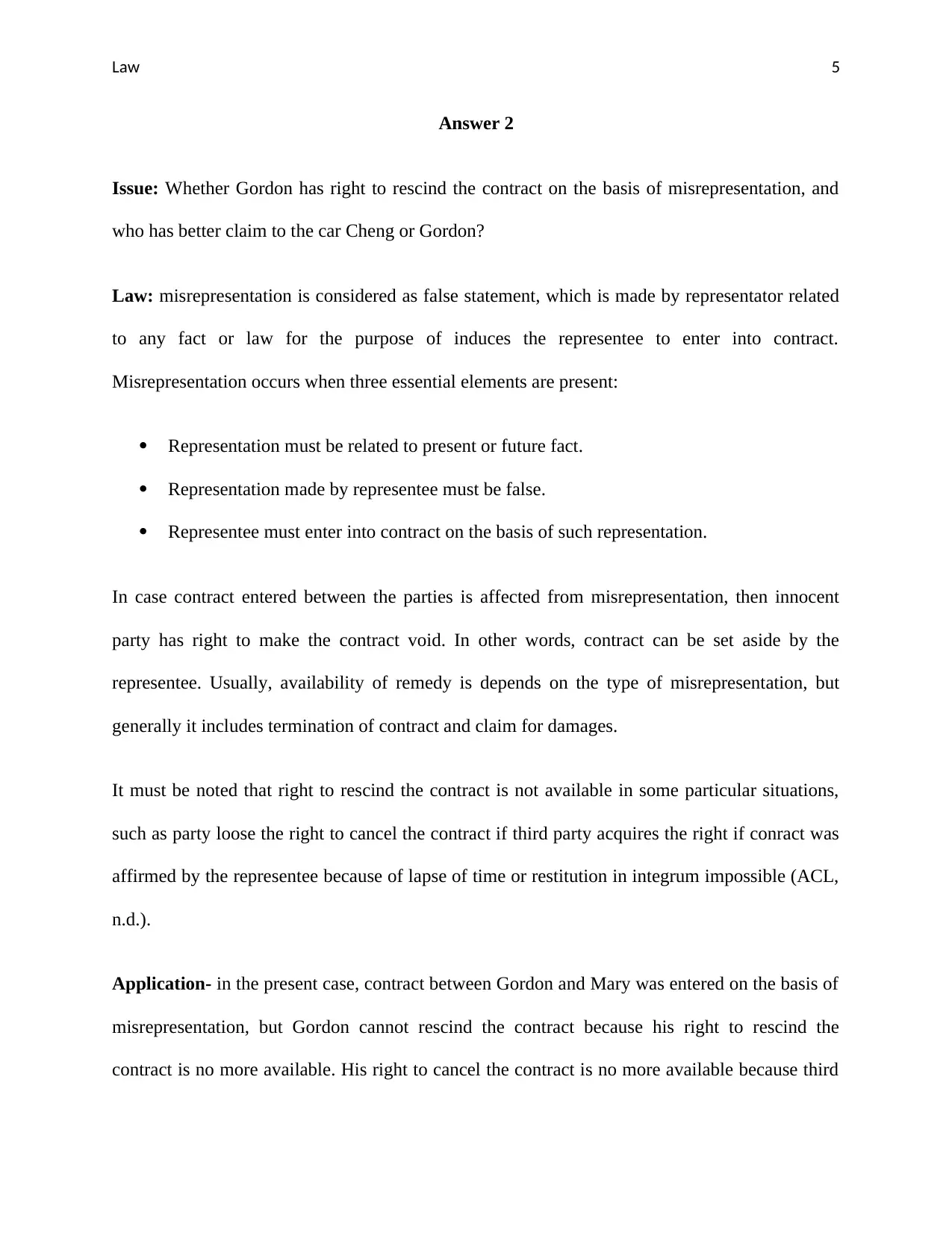
Law 5
Answer 2
Issue: Whether Gordon has right to rescind the contract on the basis of misrepresentation, and
who has better claim to the car Cheng or Gordon?
Law: misrepresentation is considered as false statement, which is made by representator related
to any fact or law for the purpose of induces the representee to enter into contract.
Misrepresentation occurs when three essential elements are present:
Representation must be related to present or future fact.
Representation made by representee must be false.
Representee must enter into contract on the basis of such representation.
In case contract entered between the parties is affected from misrepresentation, then innocent
party has right to make the contract void. In other words, contract can be set aside by the
representee. Usually, availability of remedy is depends on the type of misrepresentation, but
generally it includes termination of contract and claim for damages.
It must be noted that right to rescind the contract is not available in some particular situations,
such as party loose the right to cancel the contract if third party acquires the right if conract was
affirmed by the representee because of lapse of time or restitution in integrum impossible (ACL,
n.d.).
Application- in the present case, contract between Gordon and Mary was entered on the basis of
misrepresentation, but Gordon cannot rescind the contract because his right to rescind the
contract is no more available. His right to cancel the contract is no more available because third
Answer 2
Issue: Whether Gordon has right to rescind the contract on the basis of misrepresentation, and
who has better claim to the car Cheng or Gordon?
Law: misrepresentation is considered as false statement, which is made by representator related
to any fact or law for the purpose of induces the representee to enter into contract.
Misrepresentation occurs when three essential elements are present:
Representation must be related to present or future fact.
Representation made by representee must be false.
Representee must enter into contract on the basis of such representation.
In case contract entered between the parties is affected from misrepresentation, then innocent
party has right to make the contract void. In other words, contract can be set aside by the
representee. Usually, availability of remedy is depends on the type of misrepresentation, but
generally it includes termination of contract and claim for damages.
It must be noted that right to rescind the contract is not available in some particular situations,
such as party loose the right to cancel the contract if third party acquires the right if conract was
affirmed by the representee because of lapse of time or restitution in integrum impossible (ACL,
n.d.).
Application- in the present case, contract between Gordon and Mary was entered on the basis of
misrepresentation, but Gordon cannot rescind the contract because his right to rescind the
contract is no more available. His right to cancel the contract is no more available because third
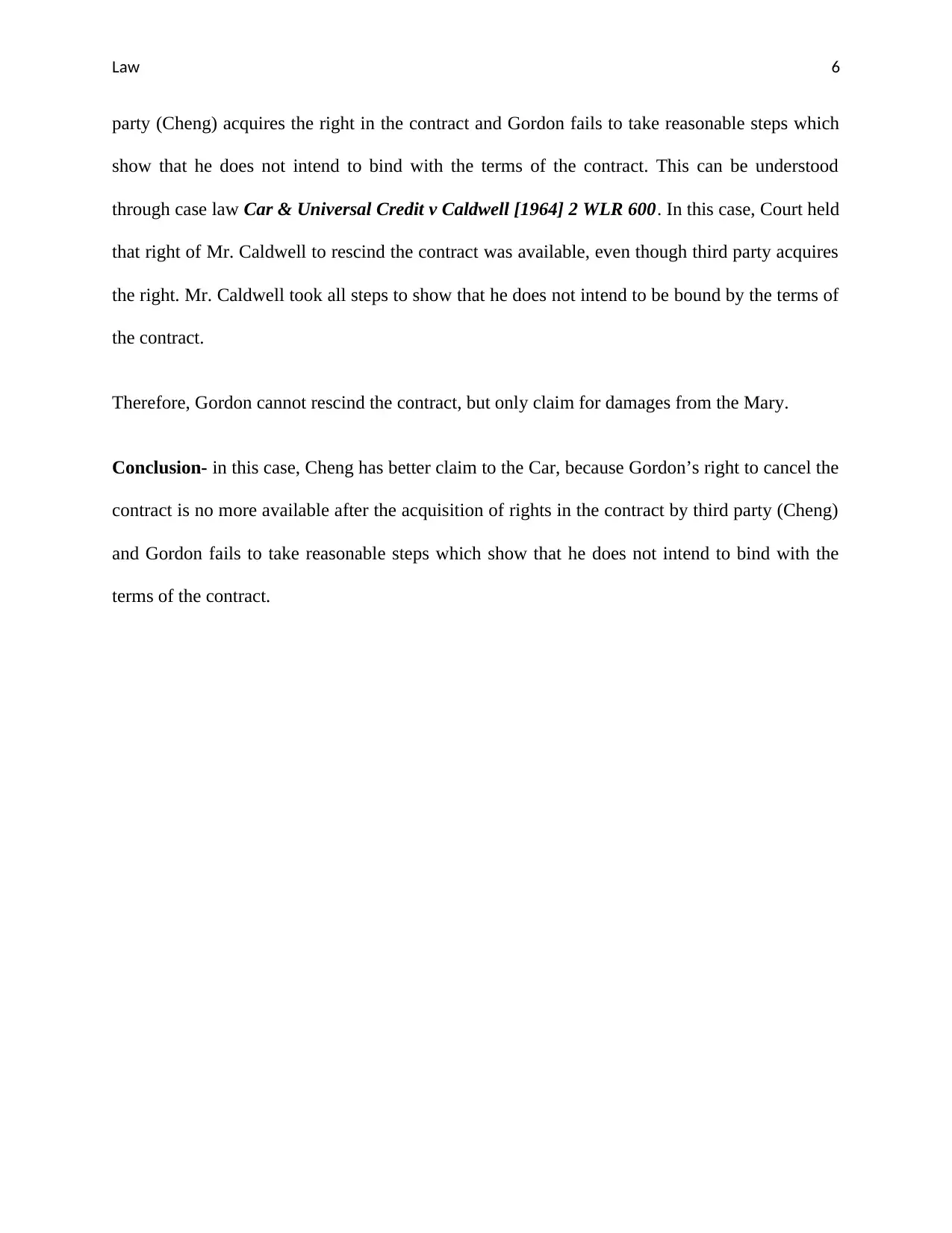
Law 6
party (Cheng) acquires the right in the contract and Gordon fails to take reasonable steps which
show that he does not intend to bind with the terms of the contract. This can be understood
through case law Car & Universal Credit v Caldwell [1964] 2 WLR 600. In this case, Court held
that right of Mr. Caldwell to rescind the contract was available, even though third party acquires
the right. Mr. Caldwell took all steps to show that he does not intend to be bound by the terms of
the contract.
Therefore, Gordon cannot rescind the contract, but only claim for damages from the Mary.
Conclusion- in this case, Cheng has better claim to the Car, because Gordon’s right to cancel the
contract is no more available after the acquisition of rights in the contract by third party (Cheng)
and Gordon fails to take reasonable steps which show that he does not intend to bind with the
terms of the contract.
party (Cheng) acquires the right in the contract and Gordon fails to take reasonable steps which
show that he does not intend to bind with the terms of the contract. This can be understood
through case law Car & Universal Credit v Caldwell [1964] 2 WLR 600. In this case, Court held
that right of Mr. Caldwell to rescind the contract was available, even though third party acquires
the right. Mr. Caldwell took all steps to show that he does not intend to be bound by the terms of
the contract.
Therefore, Gordon cannot rescind the contract, but only claim for damages from the Mary.
Conclusion- in this case, Cheng has better claim to the Car, because Gordon’s right to cancel the
contract is no more available after the acquisition of rights in the contract by third party (Cheng)
and Gordon fails to take reasonable steps which show that he does not intend to bind with the
terms of the contract.
⊘ This is a preview!⊘
Do you want full access?
Subscribe today to unlock all pages.

Trusted by 1+ million students worldwide
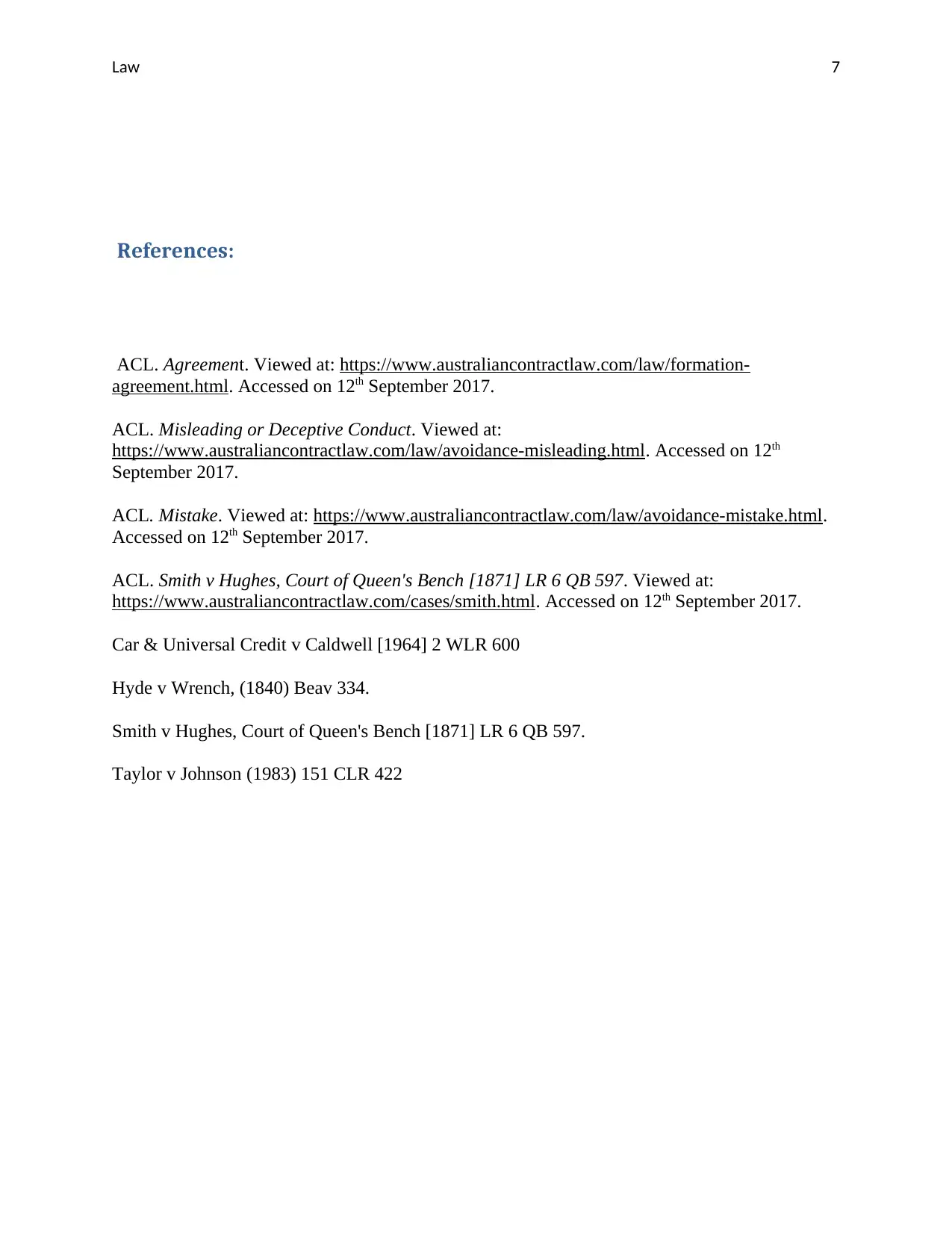
Law 7
References:
ACL. Agreement. Viewed at: https://www.australiancontractlaw.com/law/formation-
agreement.html. Accessed on 12th September 2017.
ACL. Misleading or Deceptive Conduct. Viewed at:
https://www.australiancontractlaw.com/law/avoidance-misleading.html. Accessed on 12th
September 2017.
ACL. Mistake. Viewed at: https://www.australiancontractlaw.com/law/avoidance-mistake.html.
Accessed on 12th September 2017.
ACL. Smith v Hughes, Court of Queen's Bench [1871] LR 6 QB 597. Viewed at:
https://www.australiancontractlaw.com/cases/smith.html. Accessed on 12th September 2017.
Car & Universal Credit v Caldwell [1964] 2 WLR 600
Hyde v Wrench, (1840) Beav 334.
Smith v Hughes, Court of Queen's Bench [1871] LR 6 QB 597.
Taylor v Johnson (1983) 151 CLR 422
References:
ACL. Agreement. Viewed at: https://www.australiancontractlaw.com/law/formation-
agreement.html. Accessed on 12th September 2017.
ACL. Misleading or Deceptive Conduct. Viewed at:
https://www.australiancontractlaw.com/law/avoidance-misleading.html. Accessed on 12th
September 2017.
ACL. Mistake. Viewed at: https://www.australiancontractlaw.com/law/avoidance-mistake.html.
Accessed on 12th September 2017.
ACL. Smith v Hughes, Court of Queen's Bench [1871] LR 6 QB 597. Viewed at:
https://www.australiancontractlaw.com/cases/smith.html. Accessed on 12th September 2017.
Car & Universal Credit v Caldwell [1964] 2 WLR 600
Hyde v Wrench, (1840) Beav 334.
Smith v Hughes, Court of Queen's Bench [1871] LR 6 QB 597.
Taylor v Johnson (1983) 151 CLR 422
1 out of 7
Related Documents
Your All-in-One AI-Powered Toolkit for Academic Success.
+13062052269
info@desklib.com
Available 24*7 on WhatsApp / Email
![[object Object]](/_next/static/media/star-bottom.7253800d.svg)
Unlock your academic potential
Copyright © 2020–2026 A2Z Services. All Rights Reserved. Developed and managed by ZUCOL.





